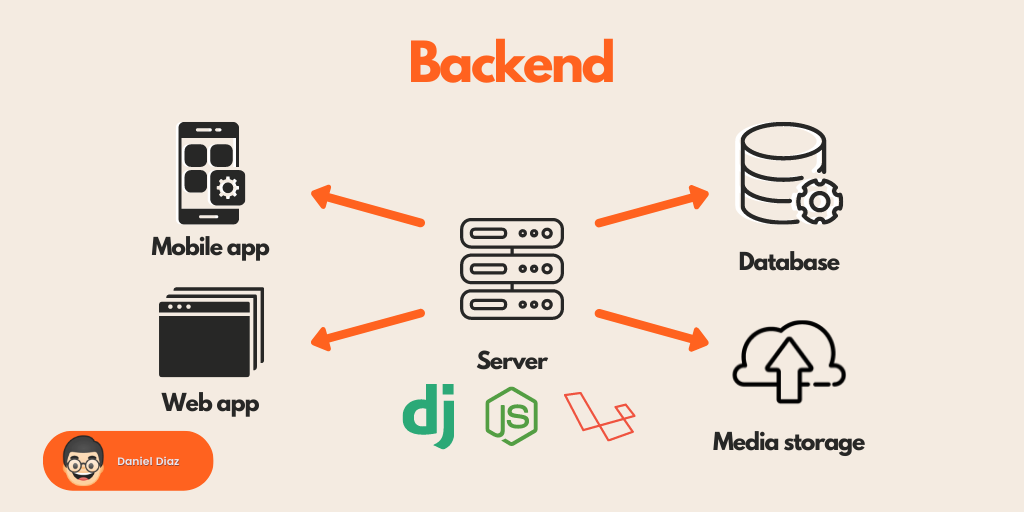What Is Backend Development And What Skills Do You Need?
To create a successful and straightforward website, it is important to have a backend developer. Some might think of this person as the IT specialist who takes care of all the technical aspects. It is not that simple, though – a backend developer has many different responsibilities, including designing the architecture of your website, setting up the network infrastructure, and installing security measures to protect your site from hackers. What is Backend Development? The term “backend development” can be used to refer to the server-side of web development. Backend developers are responsible for the functionality of a website or application. They work with databases, user accounts, and security features. Backend developers must have a strong understanding of server-side languages and frameworks. Common backend languages include PHP, Ruby on Rails, and Node.js. There are many different frameworks available for backend development, so it’s important for developers to be familiar with more than one. In addition to server-side languages and frameworks, backend developers need to have a solid understanding of front-end technologies such as HTML, CSS, and JavaScript. This is necessary for communicating with front-end developers and ensuring that the back end and front end of a website or application work together seamlessly. Backend development can be challenging but it’s also very rewarding. Seeing your code power a website or application that people use every day is an incredible feeling. If you’re interested in becoming a backend developer, start by learning one of the common server-side languages (PHP, Ruby on Rails, or Node.js) and familiarizing yourself with some of the most popular frameworks (Laravel, Express). Then, brush up on your front-end skills (HTML, CSS, JavaScript) so that you can effectively communicate with front-end developers. The Role of a Web Developer A web developer is responsible for the coding, design and layout of a website. They can also be involved in the maintenance and updates of an existing site. Web developers usually work as part of a team that includes web designers and other professionals who are responsible for the overall look and feel of the website. However, some web developers do work independently. The skills required to be a successful web developer include: Strong programming skills: Web developers need to be able to write code in various languages such as HTML, CSS, JavaScript and PHP.Excellent problem solving skills: A big part of a web developer’s job is to identify and solve problems. They need to be able to troubleshoot issues and come up with solutions quickly.Creativity: Web developers need to be creative in order to come up with innovative solutions to problems.Attention to detail: A small mistake in code can cause major problems on a website. So, web developers need to have a keen eye for detail and spot errors easily. Tools used by a Web Developer As a backend developer, you will need to be proficient in using a variety of tools to create and manage your web applications. Here are some of the most commonly used tools: -Web servers: Used to host web applications and serve them to users. Popular web servers include Apache and Nginx. -Databases: Used to store data for your web application. Popular databases include MySQL, PostgreSQL, and MongoDB. -Programming languages: Used to write the code for your web application. Popular programming languages include PHP, Java, and Python. -Web frameworks: Used to provide a structure for your web application and make development faster and easier. Popular web frameworks include Laravel, Ruby on Rails, and Express.js. -Version control systems: Used to track changes made to your codebase and share it with other developers. Popular version control systems include Git and SVN. What Skills Do You Need? In order to be a backend developer, you will need to have strong problem-solving skills. You will need to be able to debug code and troubleshoot issues. You will also need to be proficient in at least one programming language. Some popular languages used for backend development include Python, Ruby, and PHP. In addition to these technical skills, it is also important to have strong communication skills and be able to work well with others. How to Become a Web Developer? If you’re reading this, then you’re probably considering a career in backend development. But what is backend development? And what skills do you need to be a successful backend developer? In short, backend development is the process of designing, building, and maintaining the server-side of web applications. This includes the database, server-side scripts, and application logic. Backend developers work closely with frontend developers to ensure that the final product is seamless and easy to use. To be a successful backend developer, you will need strong problem-solving skills and a solid understanding of algorithms and data structures. You should also be proficient in at least one programming language (preferably Python or Java) and have experience with databases (such as MySQL or MongoDB). Familiarity with Linux is also a plus. If you’re interested in pursuing a career in backend development, we recommend checking out our blog post on how to become a web developer. Conclusion Backend development is a vital part of any website or application, and the skills you need to succeed in this field are numerous. In addition to being able to code in multiple languages, you must also be able to work with databases, create and maintain APIs, and scale applications. If you’re interested in becoming a backend developer, start by learning one of the many programming languages that are commonly used for this purpose. Then, get familiar with database management systems and learn how to create and use APIs. With these skills under your belt, you’ll be well on your way to a successful career in backend development.


